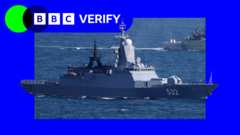
Vessel Suspected of ID Spoofing While Transiting with Sanctioned Tankers
Maritime Security Alert: Potential Evasion Tactics Uncovered
Concerns have been raised regarding a vessel, tentatively identified as the "Boikiy," which is suspected of transmitting a falsified identification signal while navigating a crucial waterway. This incident occurred in close proximity to two oil tankers currently under international sanctions, raising serious questions about potential coordinated efforts to circumvent established trade restrictions and maritime law.
The alleged falsification of the Boikiy's Automatic Identification System (AIS) signal was detected through a combination of satellite monitoring, terrestrial radar systems, and analysis of historical vessel tracking data. Discrepancies between the reported AIS information and other identifying characteristics of the vessel, such as its physical dimensions and observed course, triggered the initial investigation.
Details of the Incident
According to preliminary reports, the Boikiy was observed sailing alongside the two sanctioned tankers within a designated maritime corridor known for its strategic importance in global oil transportation. The precise location of the incident has not been publicly disclosed to avoid compromising ongoing investigations.
Here's a breakdown of the key elements:
- Suspect Vessel: Tentatively identified as the "Boikiy." Further investigation is underway to confirm its identity definitively.
- Alleged Action: Transmission of a falsified AIS signal (ID spoofing).
- Location: Sensitive waterway (location withheld for security reasons).
- Accompanied Vessels: Two oil tankers currently under international sanctions.
- Detection Method: Analysis of AIS data, satellite imagery, and radar tracking.
The Importance of AIS and the Risks of Spoofing
The Automatic Identification System (AIS) is a crucial component of maritime safety and security. It allows vessels to broadcast their identity, position, course, and speed to other ships and shore-based authorities. This information is vital for collision avoidance, search and rescue operations, and monitoring maritime traffic.
AIS spoofing, the act of transmitting false identification data, poses significant risks:
- Compromised Safety: Incorrect vessel identification can lead to miscommunication and increase the risk of collisions.
- Facilitation of Illicit Activities: Spoofing can be used to conceal the movement of vessels involved in illegal activities such as smuggling, illegal fishing, and sanctions evasion.
- Undermining Maritime Security: Falsified AIS data can disrupt maritime domain awareness and hinder efforts to detect and prevent security threats.
Potential Implications and Ongoing Investigation
The incident involving the Boikiy and the sanctioned tankers has triggered a multi-agency investigation involving maritime law enforcement, intelligence services, and international regulatory bodies. The investigation aims to determine the following:
- The true identity of the Boikiy.
- The purpose of the alleged ID spoofing.
- The extent of any coordinated effort to circumvent sanctions.
- The ultimate destination of the oil being transported by the sanctioned tankers.
The outcome of this investigation could have significant implications for international trade, maritime security, and the enforcement of sanctions regimes. Authorities are working diligently to gather evidence and hold accountable those responsible for any violations of international law.
Looking Ahead: Strengthening Maritime Security
This incident highlights the ongoing need for vigilance and enhanced maritime security measures. Key areas of focus include:
- Improved AIS Monitoring: Developing more sophisticated methods for detecting and preventing AIS spoofing.
- Enhanced Information Sharing: Fostering greater collaboration and information sharing among maritime authorities and intelligence agencies.
- Strengthened Sanctions Enforcement: Implementing more effective measures to prevent the circumvention of international sanctions.
- Technological Advancement: Exploring new technologies, such as artificial intelligence and machine learning, to improve maritime domain awareness.
The maritime community must remain proactive in addressing these challenges to ensure the safety, security, and integrity of global maritime trade.
```